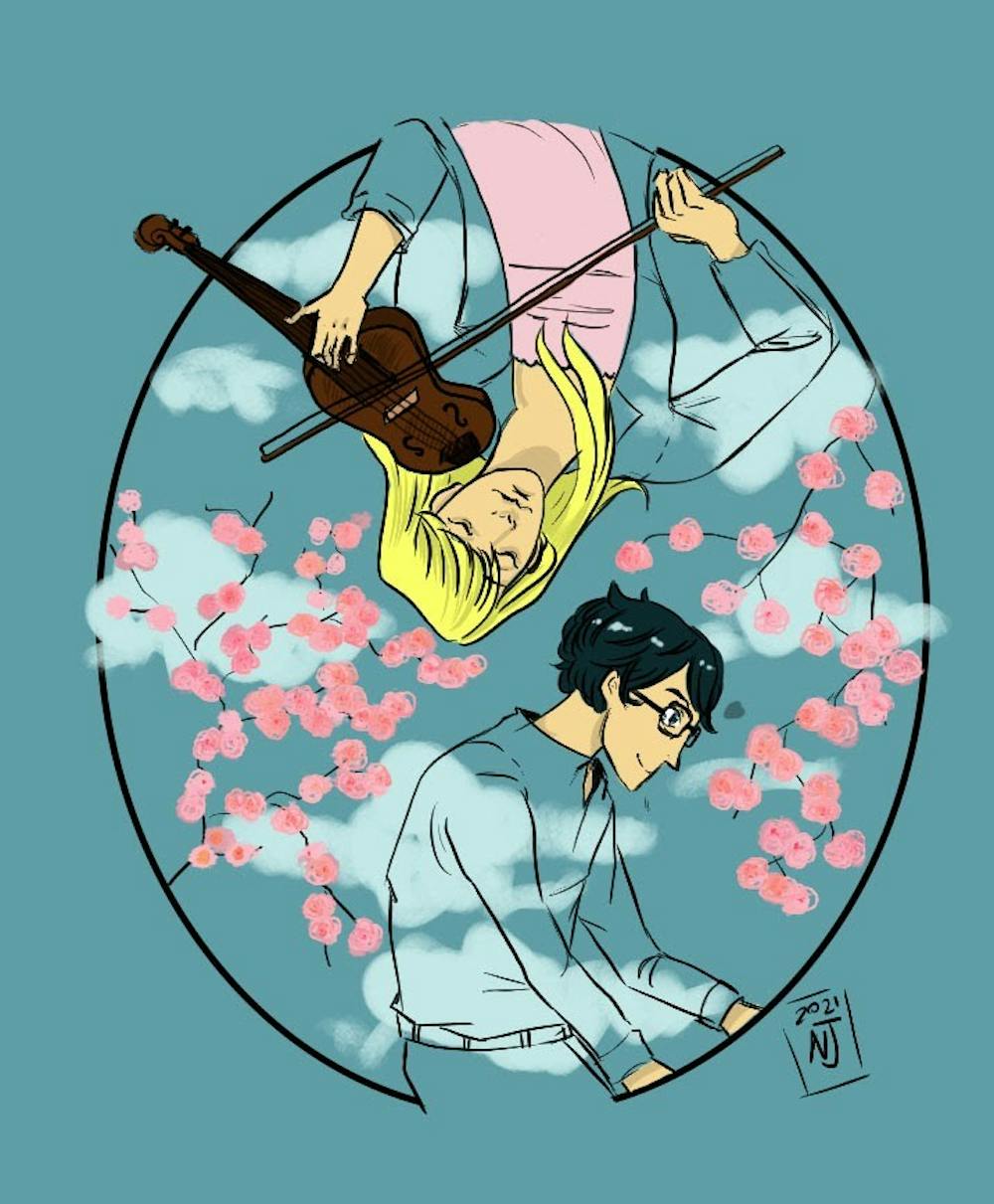What makes a love story great? Is it the realistic depictions of struggles and challenges that so many movie couples face and overcome? Or is it, perhaps, the way media can give life to those small and mundane moments that make relationships fulfilling — the way couples sing their hearts out to their favorite songs on the way to grocery shopping or those random moments when two lovers catch each other's gaze near a campfire?
Even though these aspects are many, and some are hard to even state, there’s one aspect of a love story that separates the bad ones from the good ones: authentic relatability.
“If I were that character, would I stay with him?”
“Would I be moved by the words she said?”
Those are the questions that go through a viewer’s head when watching a romance, and the more genuine a response that it can create, the better it’s received.
The anime “Your Lie in April,” written by Naoshi Arakawa, creates these feelings of relatability and authenticity better than almost any of the classic love stories I’ve watched, and even more so in light of the current pandemic, which has strained friendships and taken away loved ones from so many.
“Your Lie in April” seems to start off like the average love story: we’re first introduced to Kousei Arima, the prodigious and somewhat dense ex-piano player who starts falling in love with Kaori Miyazono, the highly captivating and unorthodox violin player who, even with a debilitating chronic disease, lights up everyone's world. We also learn of Tsubaki Sawabe, a softball player and Kousei’s life-long best friend, despite her desire to be something more. Finally, there’s Ryota Watari, the captain of the soccer team who is always looking for the next goal (and for Kaori).
But this cliché love square takes a turn for the better. Whereas most films take the easy way out of the tension developed in these situations of entangled love by either making one character morally irredeemable (say, Gale from “Mockingjay”) or making a romance so contrived that it’s obvious which lover will get chosen (Jacob vs. Edward in “Twilight”), Arakawa opts for something different: he uses the tension between characters to highlight the beauties of love, both platonic and romantic.

The most upfront example of this tension is the love triangle that takes place between Watari, Kousei, and Kaori from episode one. Watari, far more confident than Kousei, immediately takes initiative with Kaori, but Kousei never actively competes. This subversion is shocking. The protagonist and main character of our story doesn’t even attempt to put up a fight for the girl who helps him overcome his traumas and reignite his love of music — and that’s what makes it all the more convincing. Kousei values his friendship with Watari far too much to do anything to harm it, so much so that Watari eventually picks up on Kousei’s feelings and ends his pursuit of Kaori. Moments of character development such as these give such great insights into the value of friendships, something often lacking in the typical, couple-focused romantic film or show.
But Arakawa’s exploration of the romantic relationship of Kaori and Kousei is even more impressive. The journey on which the viewer goes with Kousei as they see him struggle to reignite his previous musical passions and with Kaori as she chooses to live life to the fullest even while knowing she’s counting down her days resonates with so many of us on an individual level. But it becomes an even more beautiful harmony when we see how their stories come together.
The two, bonded by their fiery loves for music, grow almost inseparable, until of course death parts them. But that is what makes “Your Lie in April” important in this current moment: just like Kousei lost Kaori, someone who lit up his entire worldview and turned his dreary skies into colorful days, so many of us in the Princeton community have lost a loved one due to COVID-19.
We’ve lost aunts and uncles with whom we’ve shared special memories during holiday dinners, cousins with whom we’ve made mischief during family visits, grandparents who shared impactful wisdom with us, and even parents who spent so much of their lives caring for us. And just like Kousei, we were distraught and lost, unsure of what our next step should be. But just like Kaori teaches Kousei, the bonds we’ve formed with our loved ones live in our hearts forever, and though our loved ones may no longer be physically here, they exist inside us.

And so I hope we take Kaori’s final words to Kousei to our hearts: that we never forget the loved ones we’ve lost, nor the impact they’ve had on us, but instead use our memories with them to light up our darkest days.








